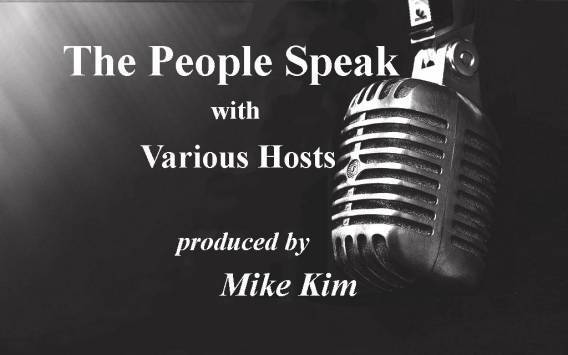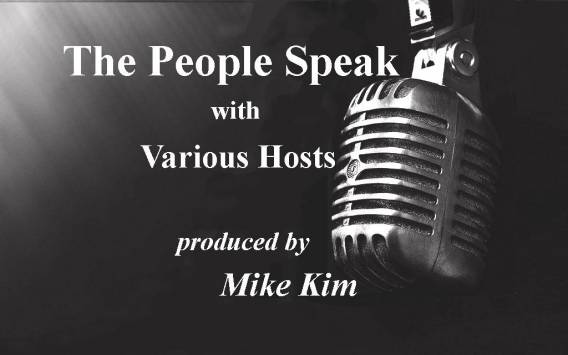The People Speak, February 21, 2017
The People Speak with Cindy Sheehan and guest Sam Koplinka-Loehr
Guest, Sam Koplinka-Loehr
Sam Koplinka-Loehr, is the Field Organizer and Outreach Consultant of the National War Tax Resistance Coordinating Committee. Sam has been a war tax resister since the late 2000’s and is a gender queer young adult who is actively involved in long-term struggles for justice. They live in Philadelphia, Pennsylvania.
Sam is one of the youngest active members of the national network, at 25, but hopefully not for long! They are working alongside many other people to build a strong movement of radical young people who refuse to pay taxes to our oppressive government and redirect the money to organizing efforts instead.
Sam has a bachelor’s degree in Environmental Justice from Middlebury College in Vermont. They have been part of direct action campaigns to stop fracked gas pipelines in Pennsylvania, build prisoner power at Angola Prison, and end police terror in Philadelphia. As the Field Organizer of NWTRCC, Sam is regularly in touch with members of the national network, connecting people to resource as well as helping to plan events and actions.
The National War Tax Resistance Coordinating Committee supports individuals who refuse to pay for war, and promotes war tax resistance in the context of a broad range of nonviolent strategies for social change. Through the redirection of our tax dollars, war tax resisters contribute directly to the struggle for peace and justice for all.
NWTRCC is a coalition of local, regional, and national groups and individuals from across the United States. For everyone interested in or actively refusing to pay taxes for war, NWTRCC offers information, referral, support, resources, publicity, campaign sponsorship, and connection to an international network of conscientious objectors to war taxes.
What is War Tax Resistance?
War tax resistance means refusing to pay some or all of the federal taxes that pay for war. While you can refuse income tax legally by lowering your taxable income, for many people war tax resistance involves civil disobedience.
In the U.S. war tax resisters refuse to pay some or all of their federal income tax and/or other taxes, like the federal excise tax on local telephone service. Income taxes and excise taxes are destined for the government’s general fund and about half of that money goes for military spending, including weapons of war and weapons of mass destruction.
People take many roads to war tax resistance. Most are motivated by a combination of reasons and actively work for peace in many other ways too. If you consider your motivations this will help you determine your method of resistance.
Refusing to pay federal income taxes is an act of civil disobedience with a long history in the U.S. America’s most well-known war tax resister was Henry David Thoreau, whose refusal to pay his poll tax because of the Mexican-American War earned him an night in jail and the experience that led him to write his influential essay, Civil Disobedience. While those of us who refuse to pay war taxes believe our refusal is just and imperative — and some of us cite international law to back up this belief — the government considers the refusal to pay these taxes to be illegal, and there are potential repercussions through the IRS collection system. For most of us who resist, the dire consequences of voluntarily paying for war are far worse that what the IRS and government can do to us.
War tax resisters are not out to enrich ourselves by evading taxes. Some of us live below the taxable income limit to avoid as fully as possible participating in war-making. Others who refuse to pay taxes to the federal government contribute that money instead for human needs here in the U.S., aid and relief work in war-torn regions, peacemaking, or international cooperation.
How To Resist
How to Refuse to Pay for War
Debbie Russell at the Texas state capitol on Tax Day, 2010
If you think more about your motivations for war tax resistance, it can help you to choose a way to get started. You can read about motivations or watch our 30-minute introductory film Death and Taxes.
Other factors will influence your method of resistance also: whether you are salaried, self-employed, off-the-grid, below taxable income, etc.
But don’t let yourself get bogged down by too much weighing the options. You can always adjust your method as your resistance develops.
Methods of Resistance
Summarized below are a few war tax resistance methods. Some are more convenient to some people than to others. And some methods are better than others at meeting particular goals. Each method also has a different set of risks associated with it.
- File and refuse to pay your taxes. This involves filling out a 1040 form and refusing to pay either a token amount of your taxes (e.g. $5, $10, $50), or a percentage representing a “military” portion (see the federal spending pie chart), or the total amount (since a portion of whatever is paid goes to the military). See Filing and Refusing for steps to get started.
- Refuse to file a tax return. This might involve trying to stay out of the system or “off the grid.” See “To File or Not To File A Tax Return”
- Earn less than the taxable income. This can involve having such a low income that you are not required to file federal income tax returns (approximately $10,300 for a single person in 2015), or it can mean filing and taking deductions so that no income tax is owed. Note: Social Security taxes are owed on income of $600 and up. These taxes will be owed if you have not had them withheld at a job, and IRS collection is the same as for income taxes. See “Low Income/Simple Living as War Tax Resistance”
- Resist the local telephone excise tax. The federal telephone excise tax historically has been related to wars and excessive military spending. It appears on local-only landline phone bills. Refusing to pay this tax is a low risk method of war tax resistance. See Hang Up On War.
Legal Protest
If you are angry about endless war and military spending but are not ready to resist, don’t be silent. Here are some other options:
- Send a letter of protest with your 1040 tax form. Enclose it along with (but do not staple it to) your form. Send copies to your elected officials.
- Write letters to the editor protesting taxes for war, especially when people are thinking about taxes during tax filing season between January and April.
- Write a message of protest on the check you send with your tax forms.
- Pay the tax with hundreds of small-denomination checks or coins.
- Lobby for Peace Tax Fund legislation that would allow conscientious objectors to pay taxes to a fund that would not be used for military spending.
- Leaflet and protest before and on tax day.
- File “Part A” of the Peace Tax Return.
For more information see the book War Tax Resistance: A Guide to Withholding Your Support from the Military, or contact a war tax resistance counselor
The People Speak

The People Speak has evolved over the years with many great guests who have been interviewed by some very fine hosts.
We are a 55 minute show airing every other Sunday between 5-6pm Pacific/8-9pm Eastern. The show features a guest interview from any number of realms of interest (entertainment, science, philosophy, healing, spirituality, activism, politics, literature, etc.).
The guests share their stories, lives, strategies, books, philosophy, films, music, or whatever it is they use as a vehicle for making a difference for the better.
The radio show name, The People Speak, is based on the idea of allowing our audience - the People - a chance to interact with the guests during the hour, and we take phone or text questions from them during the interview.
Past guests include such notables as Nobel Peace Laureate Archbishop Desmond Tutu, the late Howard Zinn, Nobel Laureates Mairead Maguire, Shirin Ebadi, Kathryn Najimy, Oliver Stone, Jesse Ventura, Richard Belzer, Cynthia McKinney, Cindy Sheehan, Scott Horton, Joan Jett, Willie Nelson, George Galloway, Roseanne Barr, Ed Asner, Chevy Chase, as well as various reps from Amnesty International, UN World Food Programme, and many others.









